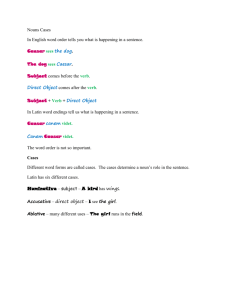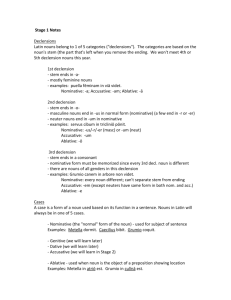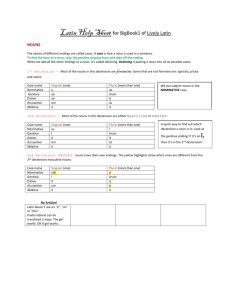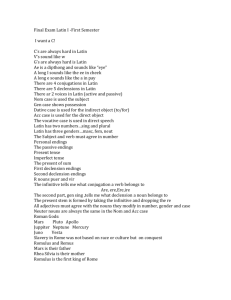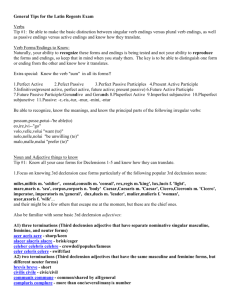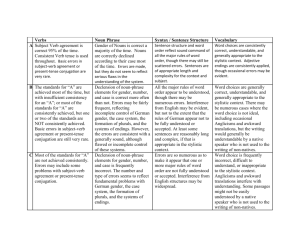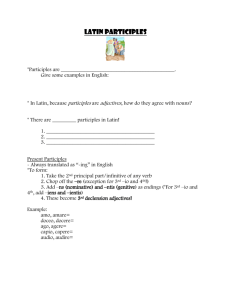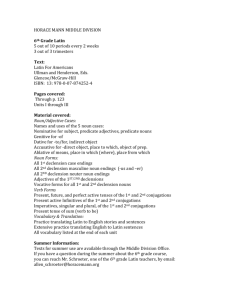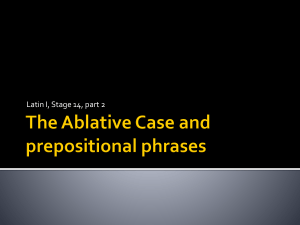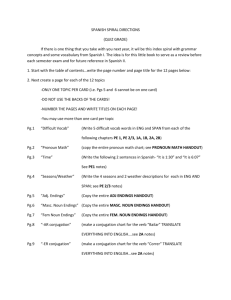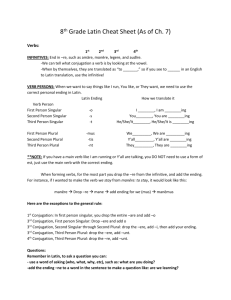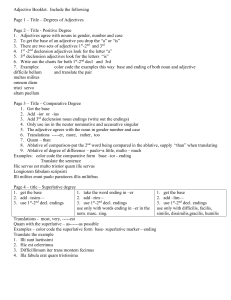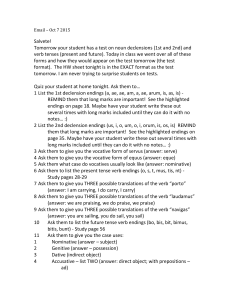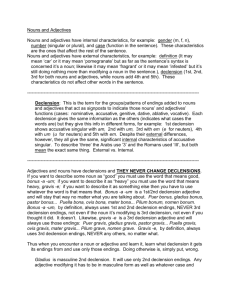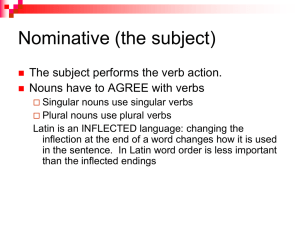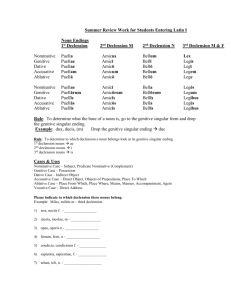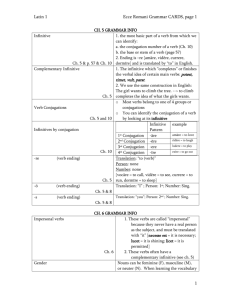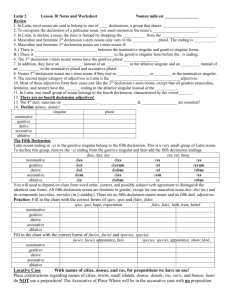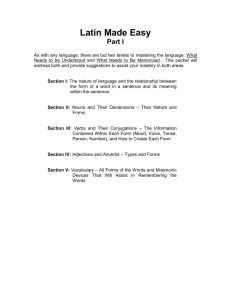Exam 1 Study Guide IA Answer Key
advertisement
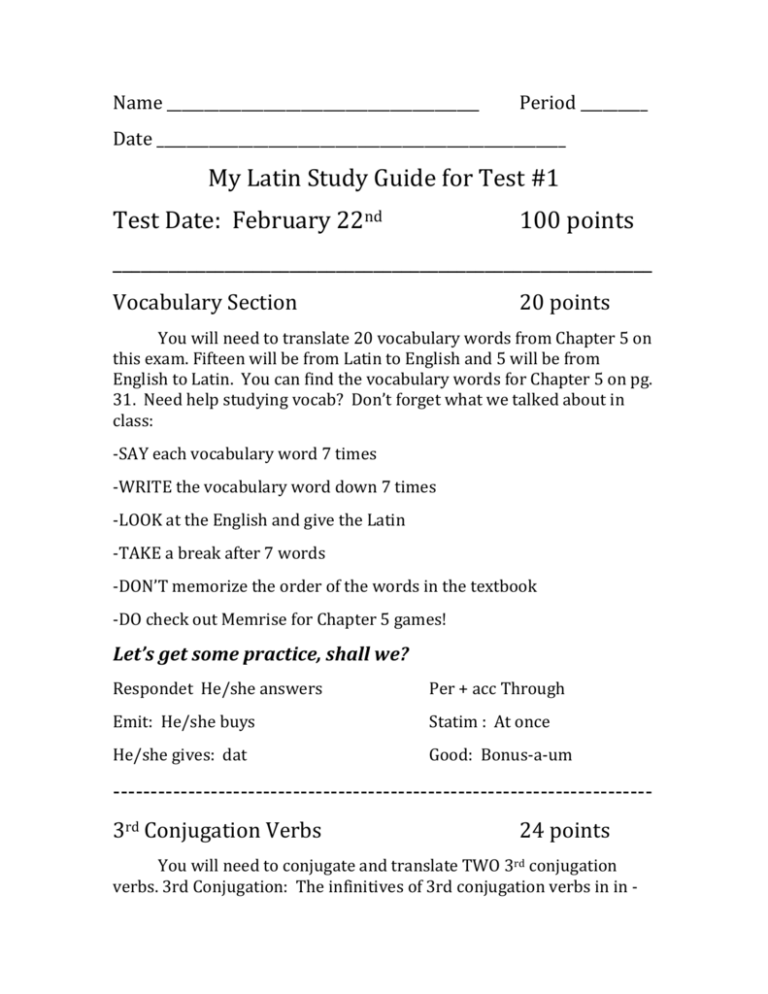
Name __________________________________________ Period _________ Date _______________________________________________________ My Latin Study Guide for Test #1 Test Date: February 22nd 100 points __________________________________________________________ Vocabulary Section 20 points You will need to translate 20 vocabulary words from Chapter 5 on this exam. Fifteen will be from Latin to English and 5 will be from English to Latin. You can find the vocabulary words for Chapter 5 on pg. 31. Need help studying vocab? Don’t forget what we talked about in class: -SAY each vocabulary word 7 times -WRITE the vocabulary word down 7 times -LOOK at the English and give the Latin -TAKE a break after 7 words -DON’T memorize the order of the words in the textbook -DO check out Memrise for Chapter 5 games! Let’s get some practice, shall we? Respondet He/she answers Per + acc Through Emit: He/she buys Statim : At once He/she gives: dat Good: Bonus-a-um -----------------------------------------------------------------------3rd Conjugation Verbs 24 points You will need to conjugate and translate TWO 3rd conjugation verbs. 3rd Conjugation: The infinitives of 3rd conjugation verbs in in - ere. Conjugating a 3rd conjugation verb is a little different than what you do for 1st and 2nd conjugation verbs. Instead of dropping -re, you now drop -ere. The endings are also slightly different. They are: -o: I _______ -is: you _______ -it: he/she/it _____ -imus: we _______ -itis: you all ______ -unt: they ______ Ex: cano, canere (to sing) Conjugation Translation cano canis canit canimus canitis canunt “I sing” “you sing” “he/she/it sings” “we sing” “you all sing” “they sing” Try one on your own: Ex: contendo, contendere (to march) Conjugation Contendo Contendis Contendit Contendimus Contenditis Translation I march you march he/she/it marches We march y’all march Nominative, Accusative and Ablative Endings 15 pts. Fill in each chart with the Nominative, Accusative and Ablative endings. Also know the function of nouns in that case and how you translate them: Nominative Case Nouns in the Nominative case are the subjects of the sentence and are translated before you translate your verb. The endings are: 1st Declension 2nd Declension Singular -a -us Plural -ae -i Accusative Case Nouns in the Accusative case are the direct objects of the sentence and are translated after you translate your verb. The endings are: 1st Declension 2nd Declension Singular -am -um Plural -as -os Ablative Case Nouns in the Ablative case are the objects of the preposition. If they don’t follow a preposition (like cum), they are translated as by, with or from. See which one fits best. The endings are: 1st Declension 2nd Declension Singular -a -o Plural -is -is Now let’s get some practice…. Nominative Case Nouns in the Nom. case are the _subjects of the sentence and are translated __before_ you translate your verb. The endings are: 1st Declension 2nd Declension Singular -a -us Plural -ae -i Okay, do it again! Accusative Case Nouns in the __Accusative case are the ____direct objects_________ of the sentence and are translated _____after________ you translate your verb. The endings are: 1st Declension 2nd Declension Singular -am -um Plural -as -os Ablative case Nouns in the __ablative case______________________ are the __objects of prepositions____________________________________________. If they don’t follow a preposition (like cum), they are translated as _by, with or from____________________. See which one fits best. 1st Declension 2nd Declension Singular -long a -long o Plural -is -is STUDY BREAK! Take a deep breath, do a little dance, and take a 10 minute break! Ready to get back to it? Ok! Let’s Go! Translation Section 30 points You will need to translate 7 sentences from Latin to English and 3 sentences from English to Latin. Sentences will consist mainly of vocabulary from Chapters 4-5 and will be worth 3 points each. Partial credit will be given for the correct vocabulary words, so try your best not to leave anything blank! Ex: Colonus iratus pueris advenit. __The angry farmer arrives with the children__ Why? Iratus (angry) has the same ending as colonus (farmer), so it has to describe that noun and translate as: The angry farmer. The noun is in the Nominative case, so I translated it before my verb advenit (arrives). Pueris (children) has an Ablative plural ending, so it translates as “by/with or from” the children. “With the children” sounds best, so that’s how I translated it. Multi amici procedunt Many friends go forward Filiae hortum magnum curant The daughters care for the great garden Ubi dormis in ludo diu, magistra clamat! When you sleep in school for a long time, the teacher shouts! Now for some English to Latin…. (BE CAREFUL WITH THE CASE ENDINGS AND VERB ENDINGS!!!) Ex: We dine by the school. WE dine = verb ending of –mus __ludo cenamus__ If you translate a noun as “by”, you put the noun in the Ablative case Try some on your own! Y’all put down the bad food. Malum cibum ponitis They praise the good son. Filium bonum laudant I rise slowly. Surgo lente Hungry for more English to Latin translation???? See Ms. Fab! Greek Mythology Section 11 points There will be 6 multiple choice questions (worth 1 point apiece) and 5 fill in the blank questions (worth 1 point apiece). Five of the fill in the blank questions will have a word bank and five will not. Make sure you know all the Greek gods we’ve discussed, their Roman names and attributes, and any myths associated with them. Having trouble remembering who is who? Check out the Gods and Games worksheets! Can’t find it? See me! Ex: A) B) C) D) The Roman name of APHRODITE is: Juno Minerva Ceres Venus Ex: _Poseidon/Neptune____________ is the god of the sea, earthquakes, and horses. Good luck studying See the WikiSpace (or me!) for study tips and ideas!
